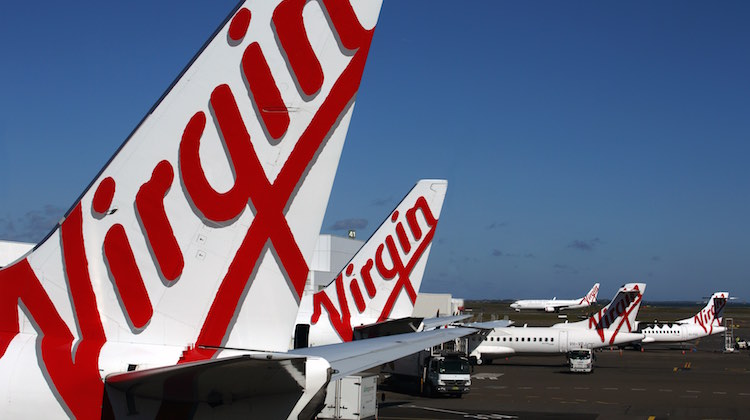
Moody’s says Virgin Australia’s improvement in earnings amid low fuel prices and its move to capture more high-yielding corporate and business travellers has been below expectations.
The ratings agency’s view was published in a statement on Tuesday evening, following Virgin’s announcement on Monday it was reviewing its capital structure and had secured a $A425 million, 12-month loan from its major shareholders.
While the loan and review of the balance sheet would be “credit positive” for Virgin and help strengthen liquidity levels, Moody’s noted the company’s adjusted debt to earnings before interest and tax ratio for the 12 months to December 31 2015 exceeded its tolerance level.
Further, Virgin’s operating cash flow fell to $A10 million the 2015/16 first half, compared with $A65 million in the prior corresponding period and the airline’s unrestricted cash balance dropped 24 per cent to $A544 million, “weakening the company’s liquidity and credit profiles”.
“While Moody’s recognizes that Virgin Australia’s overall earnings are on a positive trajectory — supported by its transformation program and low fuel prices — the pace of improvement has been below Moody’s expectations,” Moody’s said.
“Moody’s points out that Virgin Australia’s B2 corporate family rating is predicated on the deleveraging of its business. However, since 2013, the airline has not reduced its Debt/EBITDA as quickly as Moody’s has expected.”
Virgin chairman Elizabeth Bryan said on Monday the board was leading the capital structure review “to support the ongoing execution of its strategy”.
“This review will ensure the Virgin Australia group has the best capital structure in place to achieve its strategic goals and generate long-term growth and value for shareholders,” Bryan said in a statement.
The support of the four major shareholders – Air New Zealand, Etihad Airways, Singapore Airlines (SIA) and the UK-based Virgin Group – comes after the three airlines backed a $A350 million equity raising in 2013 that secured Air NZ, Etihad and SIA a seat on the Australian airline’s board.
Virgin also raised $336 million when it sold 35 per cent of its Velocity frequent flyer program to Affinity Equity Partners.
Moody’s vice president and senior analyst Ian Chitterer said Monday’s fresh loan provided “only temporary support to Virgin Australia’s credit profile”.
“The announcement that the company will undertake a review of its capital structure is therefore important for the medium-term credit profile of the airline, and will need to be concluded before any rating impact can be assessed,” Chitterer said in a statement on Tuesday.
Separately, Virgin has responded to an Australian Securities Exchange letter querying its share price movements and heavy trading volumes prior to the announcement of the capital review.
Virgin told the ASX in a letter published on Wednesday it disclosed the $A425 million loan “as soon as practicable after it was executed and prior to the market opening on Monday 21 March 2016”.
“The terms of the load facility were only finalised at approximately 11.50 pm Sunday 20 March 2016 (Sydney time),” Virgin said.
“Until this time the terms of the loan facility, including required third party consents, were substantially incomplete and outside the (its) control.
“(Virgin) has no reason to believe that confidentiality in relation to the loan facility was lost at any time prior to the release of the announcement on Monday 21 March 2016.”
Also, Virgin said it was “not aware of any reasons” why Virgin shares fell from 43 cents to 35 cents between Tuesday March 15 and Friday March 18, with trading volumes well above average levels.




